|
|
|
Sort Order |
|
|
|
Items / Page
|
|
|
|
|
|
|
| Srl | Item |
| 1 |
ID:
171847


|
|
|
|
|
| Summary/Abstract |
How do the characteristics of military leaders relate to battlefield outcomes? To answer this question, we employ original battle-level data and biographical information on hundreds of commanders in more than 250 battles in the American Civil War. We examine the relationship between two common measures of battlefield success (victory and casualties) and two latent features of commanders—competence and loyalty—that have long been seen as important in the broader study of executive appointments. We find that competent commanders are associated with more successful battlefield outcomes, as are more loyal Confederate commanders. More broadly, our analysis suggests that focusing on the relationship between military appointments and battlefield outcomes—with the latter's relatively clear definition of “success”—allows for direct examination of the relationship between appointee traits and organizational performance. As such, our results have implications for the study of conflict as well as bureaucratic politics.
|
|
|
|
|
|
|
|
|
|
|
|
|
|
|
|
| 2 |
ID:
171833


|
|
|
|
|
| Summary/Abstract |
Why do states enter into treaties? In literature on the investment treaty regime, the dominant answer is that investment treaties provide credible commitments to foreign investors. This narrative provides valuable insights but cannot account for the historical origins of the treaties, where drafters explicitly decided to exclude “strong” dispute settlement provisions. Unlike modern-day investment treaties, the early investment treaty regime did not allow investors to file claims against host states through investor-state dispute settlement (ISDS). Using historical evidence from three major capital-exporting states—the United States, the United Kingdom, and Germany—the article shows that this was a conscious design choice. Rather than providing formal dispute settlement, sanctions, and penalties to make credible commitments, Western states intended investment treaties to serve as salient focal points for the informal resolution of investment disputes. The substantive obligations were expected to fulfil their coordinating role without the shadow of judicialized dispute settlement. The argument is not just of historical interest but has broader implications for literature on international economic law dominated by the credible commitment narrative, as well as the current political backlash against ISDS.
|
|
|
|
|
|
|
|
|
|
|
|
|
|
|
|
| 3 |
ID:
171830


|
|
|
|
|
| Summary/Abstract |
Despite suggestions that international investment disputes impose a chilling effect on governments’ autonomy to set regulatory policies, we lack empirical confirmation of the phenomenon and what explains its heterogeneity across countries. Using a novel dataset of nine anti-smoking regulations in ninety-two countries from 1973 to 2016, I confirm the presence of the chilling effect, but also its boundaries. I show that countries have been significantly slower in implementing two anti-smoking policies formally challenged under investment law, while the adoption of seven undisputed regulations in this issue area continued unimpeded. Qualitative evidence from respondent and third-party governments confirm the policy-specificity of the chilling effect and show that both developed and developing countries were affected by the chill, albeit differently. By providing the first empirical confirmation of a regulatory chill and by defining its limited scope in one of the most high-profiled international investment disputes to date, my findings indicate that, even though multinational corporations can constrain state sovereignty, their effects are not necessarily expansive or indefinite.
|
|
|
|
|
|
|
|
|
|
|
|
|
|
|
|
| 4 |
ID:
171834


|
|
|
|
|
| Summary/Abstract |
Individuals tend to favor important trade partners in their foreign policy preferences. Cultural affinity is also known to influence individuals’ foreign policy stances. This study examines how citizens prioritize international relations with trading partners in the face of ethnolinguistic divisions. Using survey data on foreign policy preferences paired with data on bilateral trade between Ukraine and its two largest trade partners (Russia and the European Union [EU]), I find that ethnolinguistic identity and relative trade exposure both affect foreign policy preferences and that these effects introduce cross-cutting cleavages. Ukrainian-speaking Ukrainians in regions where the economic importance of trade with Russia is relatively higher are more likely to favor foreign policy oriented toward Russia than Ukrainian speakers elsewhere. Similarly, Russian speakers in areas with high levels of trade with the EU have more EU-oriented foreign policy preferences.
|
|
|
|
|
|
|
|
|
|
|
|
|
|
|
|
| 5 |
ID:
171841
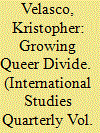

|
|
|
|
|
| Summary/Abstract |
Despite years of success, lesbian, gay, bisexual, and transgender (LGBT) norms are becoming increasingly polarized across the global landscape—with some countries strongly complying with new expectations while others openly defy them. To explain these divergent paths, I investigate the transmission of global LGBT norms via two mechanisms: transnational advocacy networks and foreign aid conditionalities. In examining LGBT policy adoption across 110 non-Organisation for Economic Co-operation and Development (OECD) countries between 1990 and 2016, I find evidence that the process through which states are exposed to LGBT norms can indeed help explain these different approaches. Exposure to LGBT norms through transnational advocacy networks enhances the effect of these norms and is associated with more progressive policy adoption, while greater dependence on foreign aid pushes states to reject LGBT norms. Consequently, this study provides new insights into how the mechanism through which countries are exposed to norms shapes compliance and adds new evidence questioning the effectiveness of foreign aid as a tool to advance LGBT rights.
|
|
|
|
|
|
|
|
|
|
|
|
|
|
|
|
| 6 |
ID:
171845
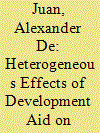

|
|
|
|
|
| Summary/Abstract |
Many countries experience massive aid surges when civil wars end. However, operational contexts tend to remain particularly sensitive due to a combination of persisting local-level cleavages and low-quality state institutions. Consequently, aid provision risks inciting distributional conflicts and violent unrest—most notably when resources are injected into areas of high social heterogeneity or particularly weak state administration. I investigate this argument in the case of postwar Nepal. I combine geo-coded aid data with village-level information on various forms of violent unrest, as well as on social demographics and institutional quality. The panel analyses indicate positive short-term effects of aid on social unrest. More fine-grained estimations reveal that this effect is driven by a short-term escalation of violence against nonstate actors—in particular in ethnically fractionalized villages under the administration of weakly performing local-level state institutions. Descriptive cross-country analyses indicate that aid may have similar violence-inducing effects in other postwar contexts.
|
|
|
|
|
|
|
|
|
|
|
|
|
|
|
|
| 7 |
ID:
171839


|
|
|
|
|
| Summary/Abstract |
This research examines the impact of human rights protests on human rights abuses in seven Latin American countries—Argentina, Brazil, Chile, Guatemala, Mexico, Nicaragua, and Venezuela. I find that protests focused broadly on human rights are associated with significant declines in human rights abuses, controlling for important factors from previous studies. Furthermore, I argue that it is important to distinguish political repression (abuses that target political activists) from coercive state oppression, which has nonpolitical targets. These two types of abuses respond to different factors, but broadly focused human rights protests are found to decrease both types of abuses. I argue further that a strong human rights movement, indicated by frequent human rights protests, discourages the police abuses associated with oppression by raising the likelihood of accountability for such abuses, including by improving the likelihood of reforms to the criminal justice system.
|
|
|
|
|
|
|
|
|
|
|
|
|
|
|
|
| 8 |
ID:
171835
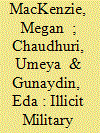

|
|
|
|
|
| Summary/Abstract |
How can we understand consistent public support and trust of the military even in climates of high rates of public awareness about military sexual violence? This article examines how the phenomenon of military sexual violence is mediated to the public through a media content and discourse analysis of newspaper reportage about military sexual violence in Australia. The analysis covers an almost thirty-year period (1989–2016) during which several “sex scandals,” some of international import, broke out. We analyze several frames used to depict the issue and conclude that military sex scandals, like other illicit military behaviors, tend to be publicly framed either as (1) a rarity that is atypical of the institution (“bad apples”) or (2) inevitable and so typical of the institution as to be unremarkable. The article then seeks to demonstrate that these seemingly disparate frames are not contradictory, but rather unify into a singular narrative. The narrative cohering these disparate frames is that military sexual violence is a phenomenon that cannot be prevented or addressed and is therefore unproblematic for the institution.
|
|
|
|
|
|
|
|
|
|
|
|
|
|
|
|
| 9 |
ID:
171832
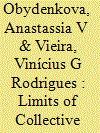

|
|
|
|
|
| Summary/Abstract |
Which limitations does the hegemon face when exerting financial statecraft through multilateral institutions? Recent studies indicate that intergovernmental organizations (IGOs) that are tools of collective financial statecraft sponsored by the United States, like the World Bank and the International Monetary Fund, lead developing states to align with Washington in the United Nations (UN). The same effect is verified in the case of US bilateral aid. Little, however, has been discussed about the effect of American-sponsored regional development banks (RDBs) in the same context. RDBs are IGOs with unique characteristics as each of them covers a region of the world and relies on resources from developed sponsors and developing borrowing members alike. In this article we aim to fill this gap in the debates on economic and financial statecraft by demonstrating through tobit models that the higher the material capabilities of a borrowing state that takes loans, the less likely it is to align with the United States at the UN General Assembly (UNGA). Membership of all RDBs but the European Bank for Reconstruction and Development (EBRD) yields the same effect. Results indicate the need to develop further research on RDBs to assess whether they create incentives for challenging the hegemon.
|
|
|
|
|
|
|
|
|
|
|
|
|
|
|
|
| 10 |
ID:
171831


|
|
|
| 11 |
ID:
171848


|
|
|
|
|
| Summary/Abstract |
Most analyses of legitimacy and legitimation in international organizations (IOs) focus on the perceptions of external audiences. In so doing, they fail to consider self-legitimation, where an IO undertakes legitimation internally, as a way of developing and reinforcing its identity. Moreover, most studies of IO legitimacy neglect the fact that IO identities are rarely uniform and instead are multiple and conflicting. I address these omissions by examining self-legitimation in three IOs—the United Nations (UN), the North Atlantic Treaty Organization (NATO), and the World Bank. These organizations are both operational and normative actors, and both institutions dependent on member states and autonomous bodies with independent expertise and capacities. These identities sometimes dictate contradictory goals and practices, forcing the organizations to violate the principles and activities considered appropriate to one of their identities, thus complicating legitimation. Based on extensive fieldwork and drawing on a range of disciplines, this article proposes a novel theory of IO self-legitimation: I argue that the need for self-legitimation depends on the degree of identity cohesion and identity hierarchy of the organization. I identify two temporal dimensions of self-legitimation, three categories of self-legitimation practices, and three broader repercussions of self-legitimation, ultimately showing that self-legitimation is a necessary and constitutive activity for IOs.
|
|
|
|
|
|
|
|
|
|
|
|
|
|
|
|
| 12 |
ID:
171840


|
|
|
|
|
| Summary/Abstract |
How can information campaigns of nongovernmental human rights organizations (HROs) to “name and shame” human rights violators improve human rights conditions? Is the effect direct—does HRO targeting induce violating states to change their behavior? Or is the effect indirect—does pressure by third parties mediate the relationship between HRO actions and changes in human rights practices? The boomerang and spiral models suggest HRO activity provokes third parties, such as other states and international organizations, to pressure violating states. This pressure, in turn, drives violating states to improve human rights conditions. On the other hand, recent empirical work finds third-party pressure can further degrade human rights conditions. In this paper we provide a comprehensive analysis of how these individual factors—HRO activities and pressure from third parties—work together in the larger chain of causal events influencing human rights conditions. Using a causal mediation model, we examine whether HRO campaigning improves human rights directly or if the effect is mediated by costs imposed by powerful actors through sanctions and military interventions. We find that, although HRO activities have an overall positive effect on human rights conditions, the negative effects of third-party pressure somewhat diminish the positive effects.
|
|
|
|
|
|
|
|
|
|
|
|
|
|
|
|
| 13 |
ID:
171850


|
|
|
|
|
| Summary/Abstract |
Recent research has begun to examine patterns of sexual exploitation and abuse (SEA) perpetrated by peacekeepers deployed in United Nations (UN) peacekeeping operations (PKOs). Yet, SEA makes up only a fraction of credible allegations of misconduct by peacekeepers. In this article we explore the contours of misconduct in UN PKOs beyond SEA allegations. We argue that the behavior of military forces in their own countries should easily predict their behavior when deployed as part of UN PKOs, which are typically set in fragile, postconflict countries where civilians have minimal protections or legal recourse. Using an original dataset of misconduct in PKOs from 2009 to 2016, we find the behavior of PKO contributor states toward their own populations strongly and consistently predicts the behavior of these states’ military forces in UN PKOs. These findings have implications for the vetting, supervision, and composition of PKOs.
|
|
|
|
|
|
|
|
|
|
|
|
|
|
|
|
| 14 |
ID:
171837


|
|
|
|
|
| Summary/Abstract |
How does the passage of time contribute to the establishment of civilian control of the State? We argue that civilian dominance of politics is achieved once civilianized institutions are adopted and sufficient time has passed to permit: (1) the development of a shared norm of civilian control within the military and (2) learning among military elites that fosters a belief that civilian rule is robust to military challenges. As a result, civilian control is self-reinforcing. We evaluate these claims by developing and validating a latent variable model of self-reinforcing institutional dynamics. We generate estimates of civilian control for all countries, 1945–2010, and find strong evidence that civilian control self-reinforces, but incrementally and over the course of several decades.
|
|
|
|
|
|
|
|
|
|
|
|
|
|
|
|
| 15 |
ID:
171836


|
|
|
|
|
| Summary/Abstract |
Why do some territorial disputes defy settlement? Through what mechanism might these resistant territorial disputes be settled? We propose that the answer involves three individually necessary and jointly sufficient conditions. First, the dispute must receive attention—i.e., be (re)placed and (re)prioritized on the dyad's agenda. Second, governments need altered preferences that expand the bargaining range so they can break deadlock and pursue settlement. Finally, disputing states need third-party assistance to facilitate, locate, incentivize, and support a settlement of their protracted dispute. We test this “AAA Model” in post–World War II Latin America. To do this, we first theorize the particular form of the general model; in post–1945 Latin America, attention, altered preferences, and third-party assistance operate through the mechanisms of militarization, democratization, and mediation respectively. We then identify resistant territorial disputes and advance a novel, multimethod research design to evaluate our hypotheses—one that relies more heavily on within-case counterfactual analysis. An extensive series of these counterfactual analyses, along with a statistical analysis, produce consistent, significant support for our model. When resistant territorial disputes in post–1945 Latin America have attention, altered preferences, and third-party assistance simultaneously, they always settle; when they lack any one factor, however, settlement never occurs.
|
|
|
|
|
|
|
|
|
|
|
|
|
|
|
|
| 16 |
ID:
171843


|
|
|
|
|
| Summary/Abstract |
In recent years, acceptance and tolerance of homosexuality has become symbolic of Western liberal, social, and political progress. This has been noted in discussions on homonormativity, homonationalism, and homocolonialism. While some of these discussions have touched on the intersections between sexuality, race, gender, and class, this article argues that this relationship has been historically produced as a standard of civilization. It notes that the politics and governance of sexuality, and its intersections with race, gender, and class, have historical relevance in producing social and political exclusions. In building this argument, the article considers how the politics and governance of sexuality have maintained a “divided world,” from the nineteenth century to the twenty-first century, transforming from a hetero- to a homocolonial standard of civilization. It draws from a number of examples, from the nineteenth century to the contemporary period, using a diverse set of materials, including ethnographic research, fieldwork, and historical documents to explain temporal and geographic connections regarding the politics of sexuality.
|
|
|
|
|
|
|
|
|
|
|
|
|
|
|
|
| 17 |
ID:
171844


|
|
|
|
|
| Summary/Abstract |
International relations (IR) scholars have recognized the importance of technology in enabling nongovernmental organizations (NGOs) to build transnational networks and enhance their influence. However, IR scholars have typically focused on elite networks across NGOs, states, and international organizations. This article considers how digital technologies generate new types of networked power between NGOs and their members. Digital tools allow for fast feedback from supporters, rapid surges in mobilization, and more decentralized campaigns. Importantly, in the digital era, NGOs must decide not only which digital platforms to use, but also whether to devolve decision-making to their supporters. Two questions arise: First, do NGO staff or supporters primarily define and produce advocacy content? Second, is the goal of digital activism to broaden or intensify participation? Answers to these questions generate four digital strategies: proselytizing, testing, conversing, and facilitating. These strategies change advocacy practices, but only facilitating strategies open up new forms of networked power based on supporter-to-supporter connections. Digital strategies have profound ramifications for individual organizations, the nature of the advocacy sector, and its power in relation to states, corporations, and other nonstate actors. Digital adoption patterns shape how NGOs choose campaigns, how they legitimate their claims, and what strategies they rely on.
|
|
|
|
|
|
|
|
|
|
|
|
|
|
|
|
| 18 |
ID:
171842


|
|
|
|
|
| Summary/Abstract |
Although globalization and international migration have increased personal connections across national borders, we know little about how these connections affect attitudes toward foreign policy. This study examines how transnational ties affect support for foreign aid in donor countries. It argues that transnational ties increase support for foreign aid via two mechanisms: group interests and cosmopolitanism. An original survey experiment embedded in a national survey of one thousand Latino Americans shows that Latinos vary significantly in the strength of their transnational ties, which is strongly correlated with support for foreign aid. The findings from the experiment, which varies the location of an American foreign aid program, demonstrate that, although group interests explain some of this effect, cosmopolitanism is also an important mechanism. Indeed, Latinos with transnational ties equally support aid to Africa and Latin America. A test of the generalizability of the findings to other racial and ethnic groups in the United States and United Kingdom reveal that group interests may be a more powerful mechanism outside of the Latino American community. This study encourages further work on the relationship between transnational ties and foreign policy attitudes and provides insight into the emerging link between international migration and foreign aid.
|
|
|
|
|
|
|
|
|
|
|
|
|
|
|
|
| 19 |
ID:
171849


|
|
|
|
|
| Summary/Abstract |
When do international institutions promote economic cooperation among countries? The World Trade Organization (WTO) is central to the multilateral trade regime and a benchmark for international dispute resolution. Yet it remains unclear whether it has been effective in restoring trade cooperation. This article uses WTO disputes to examine the impact of domestic politics in the defendant country on compliance with adverse legal rulings. I build a novel data set on compliance. Using the method of synthetic case control, I estimate the effect of adverse rulings on trade flows between disputant countries using product-level time-series trade data. I infer the defendant complied if trade flows increased after the dispute, relative to estimated levels that would have occurred in the absence of the ruling. The results show domestic political divisions—measured by veto players—hinder compliance.
|
|
|
|
|
|
|
|
|
|
|
|
|
|
|
|
| 20 |
ID:
171846
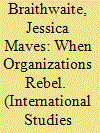

|
|
|
|
|
| Summary/Abstract |
Scholars have spent decades investigating various sources of rebellion, from societal and institutional explanations to individual motivations to take up arms against one's government. One element of the civil war process that has gone largely unstudied from a cross-national perspective is the role preexisting organizations in society play in the formation of rebel groups, principally due to a lack of comparable data on the origins of these armed actors across conflicts. In an effort to fill this gap, we present the Foundations of Rebel Group Emergence (FORGE) dataset, which offers information on the “parent” organizations and the founding processes that gave rise to rebel groups active between 1946 and 2011 in intrastate conflicts included in the Uppsala Conflict Data Program's Armed Conflict Database. The new information on rebel foundations introduced in this research note should help scholars to reconsider and newly explore a variety of conditions before, during, and after civil wars including rebel-civilian interactions, structures of rebel organizations, bargaining processes with the government, participation in postwar governance, and more.
|
|
|
|
|
|
|
|
|
|
|
|
|
|
|
|
|
|
|
|
|